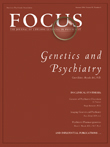The Genetics of Addictions: Uncovering the Genes
Abstract
The addictions are common chronic psychiatric diseases that today are prevented and treated using relatively untargeted and only partially effective methods. The addictions are moderately to highly heritable, which is paradoxical because these disorders require use; a choice that is itself modulated by both genes and environment. The addictions are interrelated and related to other psychiatric diseases by common neurobiological pathways, including those that modulate reward, behavioural control and the anxiety or stress response. Our future understanding of addictions will be enhanced by the identification of genes that have a role in altered substance-specific vulnerabilities such as variation in drug metabolism or drug receptors and a role in shared vulnerabilities such as variation in reward or stress resiliency.



